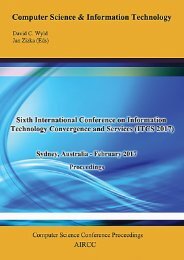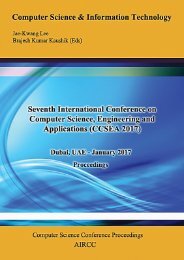CoSIT 2017
Fourth International Conference on Computer Science and Information Technology ( CoSIT 2017 ), Geneva, Switzerland - March 2017
Fourth International Conference on Computer Science and Information Technology ( CoSIT 2017 ), Geneva, Switzerland - March 2017
Create successful ePaper yourself
Turn your PDF publications into a flip-book with our unique Google optimized e-Paper software.
NEED FOR A SOFT DIMENSION<br />
Pradeep Waychal 1 and Luiz Fernando Capretz 2<br />
1 College of Engineering, Innovation Center, Pune, India<br />
2 Dept. of Electrical and Computer Engineering,<br />
Western University, London, Canada,<br />
ABSTRACT<br />
It is impossible to separate the human factors from software engineering expertise during<br />
software development, because software is developed by people and for people. The intangible<br />
nature of software has made it a difficult product to successfully create, and an examination of<br />
the many reasons for major software system failures show that the reasons for failures<br />
eventually come down to human issues. Software developers, immersed as they are in the<br />
technological aspect of the product, can quickly learn lessons from technological failures and<br />
readily come up with solutions to avoid them in the future, yet they do not learn lessons from<br />
human aspects in software engineering. Dealing with human errors is much more difficult for<br />
developers and often this aspect is overlooked in the evaluation process as developers move on<br />
to issues that they are more comfortable solving. A major reason for this oversight is that<br />
software psychology (the softer side) has not developed as extensively<br />
KEYWORDS<br />
Human Factors in Software Engineering, Human Aspects of Engineering, Engineering<br />
Accreditation<br />
1. INTRODUCTION<br />
The 2004 version of ACM/IEEE Software Engineering Curriculum mentioned document suggests<br />
only 5 hours of studies for group dynamics, whereas the 2013 draft recommends 8 hours. This is<br />
clearly not enough for a topic of such crucial importance. Besides, there should be more venues to<br />
publish papers with results in this field; workshops and conference sessions can help to increase<br />
visibility on this area and to discern the connection between human factors (including the<br />
individual, social, cultural, and organizational aspects) and the process of software development.<br />
But educators and researchers willing to venture into this area should not face an arduous task if<br />
they try to convince their colleagues and software engineering "purists" of the importance of the<br />
subject. We need to realize that the human element is pivotal to the engineering of software, and<br />
it is worth studying and teaching the soft dimension.<br />
Human-Computer Interaction (HCI), a common course within computer science departments,<br />
may be the closest subject and great strides have been made by computing professionals in<br />
adopting a human viewpoint to improve user interfaces. Although HCI addresses different topics,<br />
as it focuses on people interacting with software, HCI designers have been able to add this new<br />
dimension to their design philosophy.<br />
Likewise, software engineers could benefit immensely if even the smallest insights of human<br />
factors could be incorporated into their way of thinking. My own experiences as a software<br />
engineering educator, manager, and practitioner who continually keep human factors in mind. A<br />
course on human factor in software engineering should focus on providing a practical overview of<br />
Dhinaharan Nagamalai et al. (Eds) : <strong>CoSIT</strong>, AIAPP, SIGL, CYBI, CRIS, SEC, DMA - <strong>2017</strong><br />
pp. 141– 145, <strong>2017</strong>. © CS & IT-CSCP <strong>2017</strong><br />
DOI : 10.5121/csit.<strong>2017</strong>.70414





